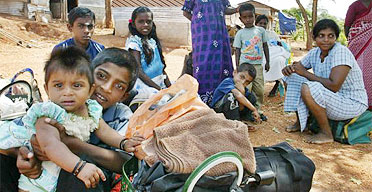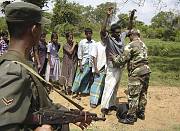Ilankai Tamil Sangam28th Year on the Web Association of Tamils of Sri Lanka in the USA |
|||||||
 Home Home Archives Archives |
MDG: One Year OnCounter-terrorism sparks human rights crisis for Sri Lanka's minoritiesby Minority Rights Group, London, December 13, 2007
One year since the Sri Lankan government promulgated tough anti-terror laws the country’s human rights situation has hit a new low, resulting in serious violations against ethnic Tamil and Muslim minorities, Minority Rights Group International says in a new briefing paper. [downloadble PDF file on right side of page] “The anti-terrorism laws fed into the deteriorating human rights situation in Sri Lanka that has resulted in hundreds of killings, abductions and disappearances, mostly of ethnic Tamils and some Muslims,” says Ishbel Matheson, MRG’s head of policy and communications.
“The last two years have seen the government more vigorously pursue its ‘war on terror’ which has resulted in thousands of civilian deaths and mass displacement of minorities,” she adds. Since the tough counter-terrorism laws were promulgated in December 2006 large numbers of ethnic Tamils have been arrested and detained on suspicion of links with the Tamil Tigers – the militant group fighting government forces for a separate state in the country’s north and east. Checkpoints have sprung up across the country and the military often conducts large-scale search operations where Tamils face harassment and risk being arrested. On 1 December 2007 following two suicide bomb attacks in the capital Colombo the government arrested over 1000 people. According to the MRG paper human rights in Sri Lanka reached a crisis point in 2007 with numerous reports of extra-judicial killings, disappearances and abductions. Many such cases go unreported, but according to Sri Lankan human rights groups some 662 people have been killed and 540 people have disappeared between January–August 2007. A vast majority of them are Tamils and some are Muslims. “It is clear that on every front it is minorities who are facing the brunt of Sri Lanka’s worsening human rights situation. The figures available only represent the reported cases and still the numbers are shocking,” Matheson says. The briefing paper also points out the human cost of Sri Lanka’s ‘war on terror’ in 2006–07: at least 3500 civilians were killed and close to 290,000, mostly Tamils and Muslims, were displaced. The government has also been responsible for forcibly returning people to their places of origin and barring thousands of Tamil families from access to their homes by creating special High Security Zones.
“Under the cover of the ‘war on terror’ the state is engaging in human rights violations against Tamils and Muslims that range from illegal arrest to land grabbing,” Matheson says. The briefing paper also accuses armed groups such as the Tamil Tigers and their splinter group the Karuna group of perpetrating large scale human right violations against minorities including killings, abductions, disappearance, extortions and the recruitment of child soldiers. “The gravity of the situation in Sri Lanka cannot be underestimated. It demands urgent international attention. Serious international pressure must be brought to bear, if the violence is to be contained and peace talks are to be put on track,” Matheson adds. The paper recommends that Britain, the European Union and the US pressure the Sri Lankan government to accept international human rights monitors. It also calls on the government of Sri Lanka and the Tamil Tigers to cease violence and return to peace talks. Notes to the editor
--------------------------------------------------------------------------------------------- Minorities Bear Brunt of Sri Lanka Violence: Rights Group by P.K. Balachandran, IANS, December 14, 2007 There appears to be no let up in the violence in Sri Lanka and the victims continue to be primarily drawn from the minority Tamil and Muslim communities, says the London-based Minority Rights Group (MRG). The briefing paper given to the media Friday said the human rights situation in Sri Lanka had reached a 'crisis point' in 2007, with 662 people being killed and 540 persons having disappeared between January and August 2007. At least 3,500 civilians were killed and close to 290,000 were displaced in 2006 and 2007. A vast majority of those killed, disappeared or displaced were Tamils and some were Muslims. MRG said the government had been responsible for forcibly returning people to their places of origin when the security situation was not conducive for their return. It had also barred Tamil families from having access to their homes by turning vast areas into special High Security Zones, which Mark Lattimer, director of MRG, described as 'land grabbing'. The briefing paper did not spare the Tamil militant groups, the LTTE and the breakaway Karuna faction. It said these groups had been committing 'large scale' human rights violations including killings, abductions, extortions, enforced disappearances and forced recruitment of children for military purposes. Here again, most of the victims had been the minorities - Tamils and Muslims. 'It is clear that on every front it is minorities who are facing the brunt of Sri Lanka's worsening human rights situation. The figures available only represent the reported cases and still the numbers are shocking. The gravity of the situation in Sri Lanka cannot be underestimated. It demands urgent international attention,' Lattimer said. Joining the UN and other international organisations, the MRG urged Britain, the European Union and the US to pressurise the Sri Lankan government into allowing the stationing of international human rights monitors in the country. At the sixth session of the UN Human Rights Council in Geneva on Dec 11, High Commissioner for Human Rights Louise Arbour had called for the setting up of an office of a UN human rights monitoring office in Sri Lanka with a 'full mandate incorporating technical assistance and public reporting'. Arbour's assessment was echoed by the US, EU, France, South Korea, Sweden, Canada and New Zealand. Rejecting the idea of UN monitoring with an office in Sri Lanka, the country's ambassador to the UN in Geneva Dayan Jayatilleke said: 'Allowing UN monitoring missions and an extended UN field presence to go wherever they like in the country is not in keeping with our laws. 'We don't want to be preached by countries whose human rights records are far from perfect. We will take suggestions for a UN Human Rights office more seriously when international bodies become far more representative of the world at large, have transparency of funding, and agendas are not donor driven. Western governments need to put their houses in order before they criticise us,' he added. The Sri Lankan Foreign Office here summoned the envoys of the US, EU, France, South Korea and Sweden to express 'deep concern' over the statements their delegations had made at the Human Rights Council session in Geneva. Foreign Secretary Palitha Kohona told them that the views expressed by the delegations did not reflect the 'real situation on the ground'. While Sri Lanka did need assistance to improve its own domestic mechanisms, it did not need a 'temporary outside entity of a judgmental nature'. 'The current mood in the country would not accommodate such an outside entity which would be highly disruptive,' he said.
| ||||||

